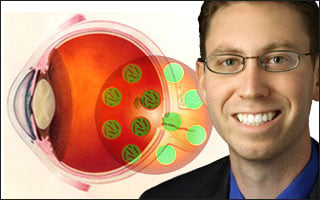In a research article by Dr. Jordan Green and Alexander Popel PhD from the Johns Hopkins Department of Biomedical Engineering, and other Johns Hopkins School of Medicine contributors, drug delivery advancements have been reported that show great promise for improved treatment of macular degeneration.
The abstract, entitled “Long-term suppression of ocular neovascularization by intraocular injection of biodegradable polymeric particles containing a serpin-derived peptide” was recently made available online at ScienceDirect.
The protein-based drug, discovered by fellow BME professor, Aleksander Popel, PhD, is currently in use for treatment of macular degeneration. While successful in blocking the growth of unwanted blood vessels in the eye that causes vision loss, the treatment does require monthly therapeutic injections.
Dr. Green’s Biomaterials and Drug Delivery Laboratory — which specializes in designing new drug-delivery systems — aimed to make the treatments safer and much less frequent.
The solution devised by Green’s team was to slow the release and depletion of the drug by covering it in non-toxic, biodegradable coatings. They first created “nanoparticles,” tiny little spheres filled with the drug. When the spheres were placed in a watery environment, the water gradually broke down the coating and released the drug a little at a time.
To maximize this effect, the team created larger spheres, called microparticles, filled with about a hundred nanoparticles per microparticle.
Testing of this microparticle-based drug delivery method in mice resulted in the desired slow-release delivery of the drug — making it effective for three times longer than that of the current treatment.
Testing will continue on other animals but the team in encouraged by the positive results.
For more information view the Johns Hopkins Press Release.

